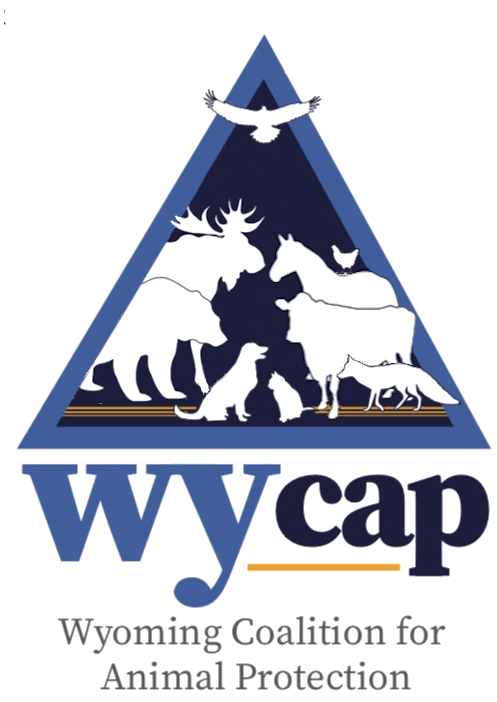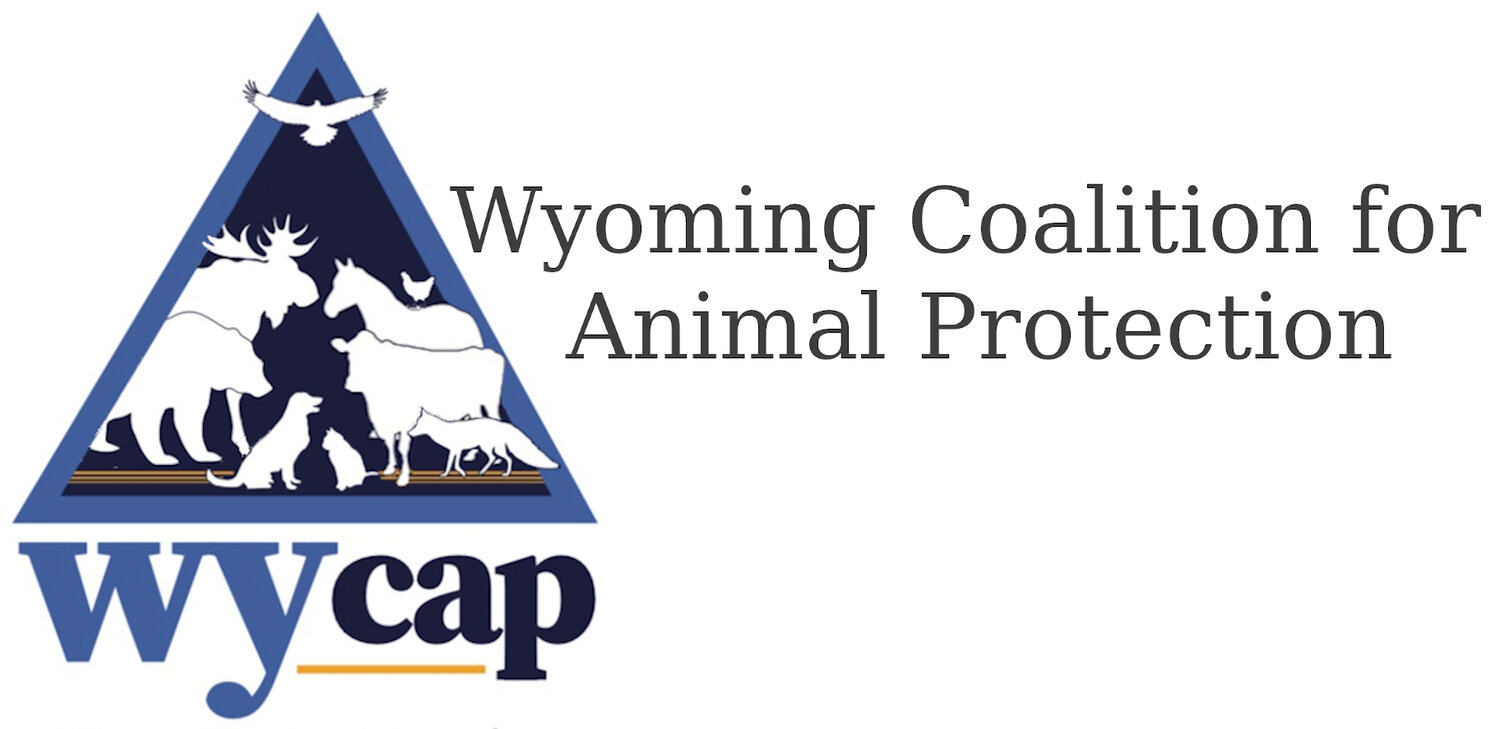LEGISLATIVE UPDATE (Four Bills)Sixty-Sixth Legislature (2021)
Summary on Animal Welfare Bills
by Sylvia Bagdonas
Thank you! Appreciation is expressed to the Joint Agriculture, State and Public Lands and Water Resources Committee for sponsoring and/or advocating on behalf of the animal welfare bills introduced and considered in the 66th Legislature. Also, noteworthy are the efforts provided by the Laramie County organizations lobbying for the bills including, but not limited to, Black Dog Animal Rescue, Cheyenne Animal Shelter, and Yola's Fund. In addition, thank you to citizens throughout Wyoming, the Wyoming Coalition for Animal Protection, and the Wyoming Coalition Against Domestic Violence and Sexual Assault.
HB 46 – Crime of Bestiality – Passed
The bill sponsor, Representative Clark Stith (Sweetwater County) responded to an event in Sweetwater County. In 2020 county officials were confronted with a case of bestiality with no Wyoming laws existing to charge the offender. Wyoming was one of eight states with no laws to prohibit the sexual assault of an animal by a human. Due to the well-researched link between animal and human abuse, the successful passage of this legislation is a good win for Wyoming citizens and their companion animals. Sexual predators don't always stick to a certain kind of victim. People who abuse animals, particularly in a sexual way, are more likely to be abusive towards humans, and often in increasingly more violent ways. Assigned Chapter Number 39.
HB 96 – Treatment of Animals (Euthanasia) – Did Not Pass
This bill sponsored by Representative Lloyd Larsen (Fremont County) was an attempt to bring an end to inhumane euthanasia in Wyoming. As we all know it is heart breaking to witness the end of a companion animal’s life. The best gift we can provide to our dog or cat at this stage is a quick and painless sleep induced by a trained technician. That gift for all animals in shelters and rescues facing end of life procedures was the goal of this proposed law change. While most shelters in Wyoming practice humane euthanasia by injection of approved drugs, some still use the gas chamber, a method every major animal welfare group believes to be a relict of the past. As described by the Humane Society of the U.S., “when an animal is injected with proper euthanasia drugs, they lose consciousness in as little as three to five seconds. Contrast that with the workings of the gas chamber. If you're sensitive to animal suffering, its operation cannot help but disturb you. Animals are placed into a small, dark box, one that's sometimes full of the smells of the animals who came before them—many of whom may have urinated or defecated before they died”. Humane euthanasia in all Wyoming shelters is a goal we need to continue to work on in the sixty-seventh Legislature.
SF 25 – Animal Impound Proceedings – Bond and Disposition – Passed
Sponsored by the Joint Agriculture, State and Public Lands and Water Resources Committee, this bill provides financial relief for the facility providing shelter, food, and medical care for an animal seized due to an animal cruelty case. This is a huge win for organizations that are responsible for the care and adoption or euthanasia of impounded animals. For too long animal control agencies and shelters in Wyoming have been burdened with the costs of this process. When animals are taken into custody the long-term cases can empty the accounts of shelters and prevent critical resources from going to other homeless, abused, and atrisk animals. The successful passage of this bill will help correct this situation. Important amendments were made to the original bill. Livestock forfeiture concerns resulted in the requirement of a hearing before animals can be seized that would lead to a negative impact on the livelihood of the animals’ owners. The standard of proof needed during the required hearing was elevated to a preponderance of the evidence. In addition, the circuit court, at the bond hearing, is responsible for establishing the cost to care for the seized animals for 90 days. At the conclusion of 90 days the owner is required to post a new bond to retain ownership, or the owner can relinquish the animal(s). When animals are seized, they remain the property of the person from whom they were seized until a court rules otherwise. Until the animals are legally forfeited, they cannot be placed in a new home. They are considered “live evidence” and must be retained until the conclusion of the legal proceedings. Unfortunately, the court system generally does not prioritize or expedite animal cruelty cases. Hopefully SF 25 will provide additional financial support to animal shelters in the state as they await either forfeiture or adjudication of cruelty cases. In addition, the new law provides a guarantee that a hearing for the owner will be expedited before an animal is confiscated. The bill will go into effect on July 1, 2021. Assigned Chapter Number 119.
SF 26 – Animal Abuse Statutes Reorganization and Update – Passed
Sponsored by the Joint Agriculture, State and Public Lands and Water Resources Committee, this bill passed quickly through the legislature early in the session. After years of adding amendments to the Wyoming animal abuse statutes, creating a patchwork of laws with varying levels of applicability for various categories of animals, the goal of this bill was to consolidate statutes where feasible, review inconsistencies, clean up statute definitions, and refine sections. The bill received a 23– 5 vote in the Senate and a unanimous vote 60–0 in the House. It was signed into law on February 9. The bill will go into effect on July 1, 2021. Assigned Chapter Number 30.
Copies of legislation can be accessed at: https://wyoleg.gov/Legislation/2021
Sylvia Bagdonas is retired from the State of Wyoming, having worked for 30 years in crime victim assistance services, tobacco prevention and behavioral health services. Sylvia holds a Bachelor’s Degree from Colorado State University and a Master’s Degree in Psychology, Counseling and Guidance from the University of Northern Colorado. Her interest in animal welfare evolved from growing up on a farm, marriage to a wildlife biologist, and serving as a foster home for lost and abandoned animals.


